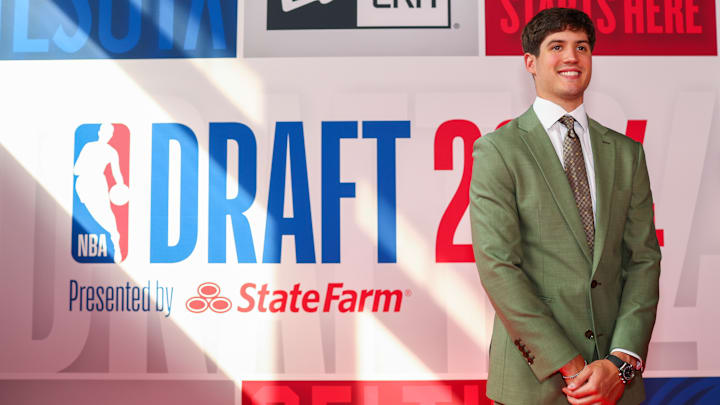With the third pick in the 2024 NBA Draft, the Houston Rockets select freshman guard Reed Sheppard from the University of Kentucky. You might be asking, “Why did he write that sentence like he was announcing the pick?” And I’ll tell you why, those words contain a treasure trove of information about how Reed Sheppard will perform in the NBA.
Kentucky guards and the unbearable weight of under-drafted talent
There’s a running joke that Kentucky guards are destined to outperform their draft slot. However, with how successful Shai Gilgeous-Alexander (11th), Devin Booker (13th), Tyrese Maxey (21st), and Tyler Herro (13th) have been after being drafted outside the top 10, there’s a compelling case that this is no joking matter.
In fact, Kentucky guards under John Calipari have transitioned better to the NBA than the rest of their backcourt collegiate peers. Since Calipari took over Kentucky in 2009, he has seen 13 guards drafted with top 25 picks, and 10 of the 13 have bested the average career Box Plus/Minus (BPM)* of their draft slot. On average, they have produced a BPM plus-1.6 better than their average draft position, which is a massive margin.
*The average is based on career BPMs between 1980 and 2020. BPM is a box score estimate of how many points per 100 possessions a player contributed above a league-average player. 0.0 is a decent starter, 2.0 is a strong starter, 4.0 is an All-Star season, 6.0 is an All-NBA season, 8.0 is an MVP-caliber season, and 10.0 is an All-time season.
For whatever reason, John Calipari was able to hoard a continuous stream of productive NBA-level guards at Kentucky, but couldn’t get them to be drafted where they should have. Which leads us to Reed Sheppard, the third overall pick, and the Houston Rockets.
What to expect out of Reed Sheppard in the NBA
The average third overall pick, between 1980 and 2020, has produced a career BPM of 1.19. For reference, Nic Claxton, Franz Wagner, Jalen Johnson, and Brandon Ingram (ranking 64-69) finished the 2023-24 season with BPMs of 1.2. If Sheppard were to continue the Kentucky guard trend of beating his draft position, he’d almost assuredly be a top-50 player in his prime. And if he were to best his draft position BPM at the same rate as previous Kentucky guards, he’d end with a career BPM of 2.8 (based on average difference) or 2.3 (based on average percent change).
A career BPM between 2.8 and 2.3 would be a tremendous outcome for Sheppard and the Rockets. A career BPM of 2.8 would rank 83rd all-time and a career BPM of 2.3 would rank 108th. Remember, players generally follow career arcs where they start slow, build to a peak, and then decline in production. The list of notable modern guards with a career BPM between 2.8 and 2.3 includes; Maurice Cheeks, Kemba Walker, Kyle Lowry, Isiah Thomas, Baron Davis, Gilbert Arenas, Fred VanVleet, Mike Conley, and Rod Strickland. While this back-of-the-envelope math suggests Sheppard could be a Hall of Famer should his career last long enough, there is reason to believe he could live up to it.
Sheppard’s statistical profile is incredible
Many statistically based draft models saw Reed Sheppard as the best prospect in the 2024 draft and one of the better prospects of the past decade. His college 3-point shooting efficiency of 52.1 percent on 4.4 attempts per game is unconscionable. Even if his efficiency declines by 12 percent due to tougher defenders, increased depth, and a higher volume of attempts in the NBA, he’d still be an elite 3-point shooter. Shooting isn’t the only skill that matters, but it’s maybe the single most important trait a player can possess.
Sheppard’s block (2.5 percent) and steal (4.6 percent) percentages were also exceptional in college, and the two metrics translate very well to NBA production. While his lack of size (6’2) will probably limit his defensive value in the NBA, he has incredible instincts and has a far distance to fall before he becomes a liability.
The only real concern is his usage was a pedestrian 18 percent. This could mean he’s destined to be a role player, but it also might suggest he was only scratching the surface of his offensive abilities in college. However, there’s a very good reason his usage was so low. He played next to Rob Dillingham.
Dillingham, who was drafted eighth overall by the Timberwolves, sported a usage of 30.3 percent playing next to Sheppard. Dillingham is a dynamite offensive threat, who projects to be an effective NBA-level scorer, and it wouldn’t be a surprise if Sheppard’s reduced usage was more about Dillingham’s game than his own. When you run a program like how John Calipari ran Kentucky, where your core players are one-and-done, you have to make the most of your roster on a yearly basis. There’s no sense wasting your only season with Rob Dillingham teaching him how to play off the ball when Reed Sheppard is the best off-ball player in the country.
The big unknown for Sheppard in the NBA isn’t whether he’ll be a good player as defined by his role, it’s what his role will be. There’s little question his floor is a defensive playmaker who can shoot the lights out. The question is just how much of an offense can he handle? If it’s just 18 percent, then the Rockets have Tyus Jones with better defense. If it’s 25 percent, they have an All-Star. And if it’s 30 percent, we’re talking about an All-NBA caliber player. Kentucky guards almost always over-deliver, and there’s every reason to believe Sheppard will as well.
